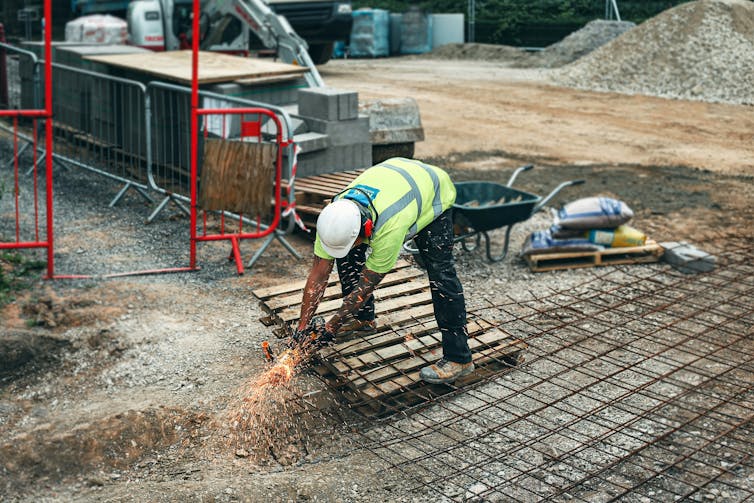Cate Blanchett, like most Australians, thinks she’s middle class. An expert on class explains why that matters
- Written by Rose Butler, Senior Research Fellow, Alfred Deakin Institute for Citizenship and Globalisation, Deakin University

Cate Blanchett, whose net worth is estimated at A$140 million, has described herself as “middle class” – unwittingly unleashing a furore.
How could someone in a highly powerful, elite echelon of society who owns multiple properties across Australia and the UK claim to be middle class, especially at a time when the wealth gap between “the top” and “the bottom” has become so stark?
Recent 2024 research shows that in Australia, nearly half of all wealth is held by the top 10% of households – who hold 15 times the wealth of the lowest 60%.
Yet Blanchett’s claim is not unusual. Studies have long shown that Australians tend to overly claim to be middle class when ranked by income, regardless of whether they fall below or above “the middle”.
Some have suggested this is because identifying as middle class sits comfortably with being “average” or “ordinary”. Others find it supports moralised neoliberal agendas of self-responsibility. All are widely valorised narratives in Australian public life, routinely used for political gain.
What is ‘middle class’ anyway?
Class categories were once tied to occupations. But recent Australia-based studies, like those in the UK, argue the reality of class breakdown in Australia is much more complicated than the three categories we’re used to – working class, middle class and upper class.
Yes, class is based on employment and the income this produces – but it is also generated by other forms of economic capital (increasingly through family wealth and assets), as well as our combinations of social capital and cultural capital.
In everyday life, however, more established ways of thinking and feeling about class continue to carry weight. The language of three classes, but especially the terms “working class” and “middle class”, remains pervasive and meaningful to many in Australia, regardless of its accuracy.
To further complicate things, people move between different classed worlds over their lives, in ways that are complex. There may be a class difference between the family environment we grew up in (our class origin) and the world we live in as an adult (our class destination).
This might be the case, for example, for people whose lives are significantly mobile, or for those who have experienced upward social mobility through higher education.
Some people continue to claim the class identity of their childhood, despite inhabiting a differently classed world as an adult. Class identification is deeply personal and complicated. The class we feel we belong to (the one that first shaped who we are and how we think and behave) can be at odds with our objective class reality – and with the opportunities, resources and security now available to us.
This becomes a problem when those in positions of significant wealth and power continue to believe they represent the majority – which Blanchett does not. Blanchett’s class origin may have been middle class, but her class destination – the one she currently inhabits within the 1% – is certainly not.
Why does it matter?
We tend to locate our class identity in relation to the others in our immediate social surroundings. Our perception of wealth inequality comes from our day-to-day experiences.
If our partner, friends, workmates and social networks are all comprised of highly wealthy individuals, and if our children’s schools are segregated enclaves of wealth and privilege (as the kind attended by Australia’s economic, political and cultural elite – including the children of Hollywood actors – often are), we will likely see our own experiences as ordinary. Read: middle class.
This kind of class misidentification in turn supports meritocratic ideals that dictate hard work and talent will ultimately lead to success – though ample evidence shows this is not the case.
This shifts attention from the unequal distribution of resources in society, which contributes significantly to who gets ahead. It encourages us to instead focus on individuals as sole architects of their own success or failure.
This is especially rife in the arts, a profession that lauds the downplaying of privilege.
Research on wealth inequality also suggests the more unequal a society is, the less likely its citizens are to take notice of that inequality. People on either side of the divide become unable to perceive the extent of the gulf that separates their lives from others. As this gap increases, other people’s lives become harder to view, understand and empathise with.
This perception gap is one reason why some advocate for more opportunities to enable people to study, live and work alongside others from different class backgrounds.
Confronting class
Blanchett’s claim to being middle class is not unique. A similar furore erupted in the UK last year when Victoria Beckham infamously claimed, in the documentary Beckham, to be from a “working class” family.
Husband David Beckham, listening from another room, demanded off-camera: “Be honest!”. He then challenged her (several times) to reveal: “What car did your dad drive you to school in?”. Her expression shifted to one of both frustration and embarrassment, as she admitted “in the ‘80s, my dad had a Rolls Royce”.
British people often downplay or selectively obscure their class background, too. However, they are more likely to misidentify as working class, rather than middle class. Meanwhile, the chance for people from poorer households in the UK to “move up the social ladder” has become much harder.
As Australia confronts increasing wealth inequality, the downplaying of wealth and privilege among elites – or the failure to see it at all – becomes all the more untenable.
Authors: Rose Butler, Senior Research Fellow, Alfred Deakin Institute for Citizenship and Globalisation, Deakin University



















